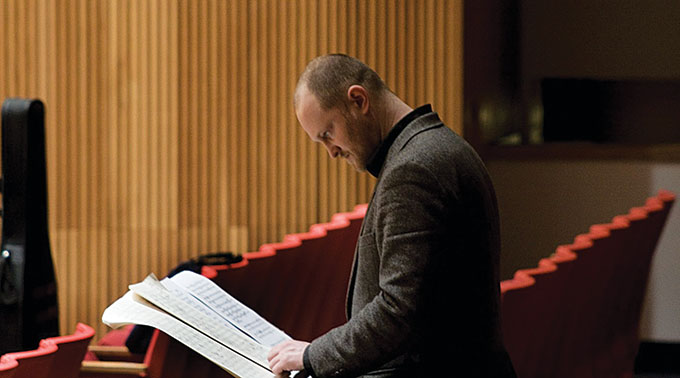Next story: Opening This Week...
Bringing in the New
by Jan Jezioro

The UB Symphony offers the area premiere of Elgar’s Falstaff
Daniel Bassin, music director of the University at Buffalo Symphony Orchestra, consistently programs some of the most innovative classical music in Western New York. While the BPO has programmed several orchestral works by the English composer Edward Elgar more than a few times, including his cello concerto and his first symphony and, most frequently, his popular Enigma Variations, it has never performed his colorful tone poem Falstaff in a Kleinhans series concert.
Bassin will compensate for that deficiency this Saturday, April 26 at 7:30pm in Slee Hall, when he leads the UBSO in Elgar’s work based on Shakespeare’s character of Sir John Falstaff. The UB Choir and members of the Unitarian Universalist Church of Buffalo’s Choir, which Bassin also directs, will join the UBSO for a program of English music that includes music by Henry Purcell and Ralph Vaughan Williams.
Bassin, who will be defending his PhD dissertation in composition this May, has firmly established his reputation as the most realistically creative leader in the history of the USBO. While leading the musicians of the USBO, of whom 90 percent are not music majors, Bassin has managed to inspire them to work to the level necessary to achieve the competency to perform works as complex as last spring’s Buffalo premiere of Lutosławski’s challenging Cello Concerto and this year’s Falstaff.
“In many ways,” says Bassin, “Falstaff is the most difficult and ambitious piece I’ve brought to the students of the UBSO. While a year ago my students were confronted with brand-new playing techniques, notational conventions, and surely a wholly unfamiliar musical aesthetic when we presented the Lutosławski concerto, the challenge in making Falstaff come to life lies in Elgar’s subtle and obsessively specific indications for musical nuance. In one regard many of my students have been uniquely prepared for this challenge, as last school year we did a program that included Elgar’s rightly famous Enigma Variations. In preparing that work, I had all of my students carefully study Elgar’s own recording of that piece, which I personally take as a sort of Rosetta Stone for Elgar’s expressive sound world. The occasional and specifically targeted indications of ‘tenuto,’ ‘sostenuto,’ ‘portamento,’ ‘con fuoco,’ and every variety of articulation and dynamic nuance found in the Enigma populate virtually every bar of Falstaff. There’s an interpretive challenge literally within the first two notes of the piece. Nonetheless, I firmly believe that the efforts in realizing Elgar’s idiosyncratic and obsessive musical details are worth it, since Falstaff is in many ways Elgar’s masterpiece. Essentially Elgar created a four-movement symphony with two additional interludes, each section corresponding to a scene from one of the historical plays. Elgar goes out of his way to say ‘in examining or listening to Falstaff, the caricature in The Merry Wives of Windsor, which, unluckily, is better known to English playgoers than the real Falstaff, must be forgotten.’”
The program also includes two of Purcell’s Shakespeare adaptations: “Hence with your trifling deity!” from Timon of Athens, and “Come let us leave this town” from The Fairy Queen, featuring Michael Harris, bass and Sorcha Bell, soprano, with Su Lee, harpsichord, as well as Vaughan Williams’s exquisite Serenade to Music.
Admission is free. More information at www.slee.buffalo.edu.
Buffalo Philharmonic Orchestra
Has it really been nine years since the world-class British percussionist Colin Currie last performed with the BPO, totally wining the audience over with his masterly subtle take on Scottish composer James MacMillan’s Veni Veni Emmanuel? Currie will be back this weekend with the BPO under the baton of its music director JoAnn Falletta, on Saturday at 8pm and Sunday at 2:30pm as soloist in American composer Jennifer Higdon’s Percussion Concerto, which won a 2010 Grammy Award for best contemporary classical composition. Writing about a performance of the work, the New York Times noted, “Ms. Higdon aims to please in her colorful, propulsive and unabashedly accessible 25-minute concerto. The performance elicited a cheering ovation for the extraordinary percussion soloist, Colin Currie, and for the composer.”
In a program heavily weighted towards area premieres, Falletta will lead the BPO in a performance of the 1942 Symphony No. 1 by the American composer Jerome Moross, who is perhaps now best remembered for his scores to blockbuster Hollywood films such as The Big Country and The Cardinal. Perhaps the most potentially fascinating work on the program is by the young American composer Russell Platt. Eurydice: A Serenade for Strings is his take on the inexhaustibly intriguing ancient Greek myth of the poet, prophet and musician who descended into hell in an unsuccessful attempt to return his wife to the world of the living. All is not doom and gloom, however—or is it?)—as the program concludes with Bernstein’s brilliantly written Symphonic Dances from West Side Story.
blog comments powered by Disqus|
Issue Navigation> Issue Index > v13n17 (Week of Thursday, April 24) > Bringing in the New This Week's Issue • Artvoice Daily • Artvoice TV • Events Calendar • Classifieds |









 Current Issue
Current Issue